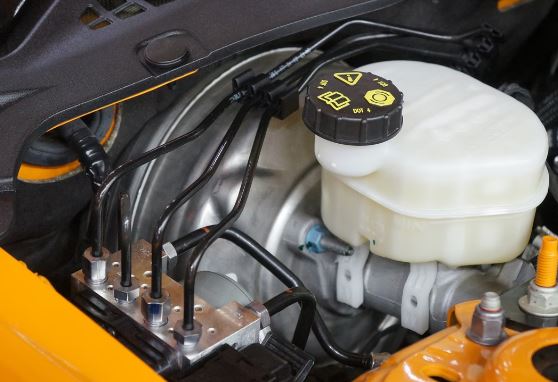Welcome to our comprehensive guide on dealing with the common automotive issue of “brake fluid low but no leak.” If you’ve ever found yourself in a situation where your vehicle’s brake fluid level is mysteriously dropping, but there doesn’t appear to be any visible leaks, you’re not alone. This puzzling scenario can leave many drivers scratching their heads and wondering what might be causing the problem.
Here, we will delve into the potential causes of low brake fluid levels without any apparent leaks, provide some troubleshooting tips, and offer practical solutions to help you get your vehicle back on the road safely. So, if you’re ready to uncover the mystery behind this phenomenon and regain your peace of mind, let’s dive in and find out more.
Possible Causes
Brake fluid is an essential component of a vehicle’s braking system. When the brake fluid level is low, it can indicate a problem with the braking system. However, in some cases, the brake fluid level may be low, but there is no visible leak. Here are some possible causes of low brake fluid with no visible leak:
- Worn Brake Pads
Worn brake pads can cause low brake fluid levels. When the brake pads wear down, the brake calipers need to extend further to make contact with the rotor. This, in turn, causes the brake fluid level to drop. If the brake pads are worn, they need to be replaced immediately to avoid further damage to the braking system.
- Leaking Brake Caliper
A leaking brake caliper can also cause low brake fluid levels. The brake caliper is responsible for holding the brake pads and applying pressure to the rotor. If the caliper is leaking, it can cause the brake fluid to leak out.
- Master Cylinder Failure
The master cylinder is responsible for distributing the brake fluid to the brake calipers. If the master cylinder fails, it can cause the brake fluid to leak out of the system. This can cause low brake fluid levels.
In the end, low brake fluid levels with no visible leak can indicate a problem with the braking system. The possible causes include worn brake pads, a leaking brake caliper, and master cylinder failure.
Symptoms

If your brake fluid level is low but there is no visible leak, there are several symptoms you may experience while driving. Here are the most common ones:
- Brake Warning Light On
One of the first signs that your brake fluid level is low is the brake warning light on your dashboard. This light is designed to alert you to any issues with your brake system, including low brake fluid levels. If you see this light come on while driving, it is important to check your brake fluid level as soon as possible.
- Soft or Spongy Brake Pedal
Another symptom of low brake fluid levels is a soft or spongy brake pedal. If you notice that your brake pedal feels different than normal, it could be a sign that your brake fluid level is low. A soft or spongy brake pedal can make it difficult to stop your vehicle quickly, which can be dangerous in emergency situations.
- Reduced Brake Performance
Low brake fluid levels can also cause reduced brake performance. If you notice that your vehicle is taking longer to stop than normal, or if you have to push the brake pedal harder than usual, it could be a sign that your brake fluid level is low. Reduced brake performance can make it difficult to stop your vehicle in time to avoid an accident.
In summary, if you experience any of these symptoms while driving, it is important to check your brake fluid level as soon as possible. Low brake fluid levels can be a serious safety issue, so it is important to address the problem as soon as possible.
Potential Risks

- Complete Brake Failure
Low brake fluid levels can lead to complete brake failure, which can be extremely dangerous. If the brake fluid is low, the brakes may not be able to generate enough pressure to stop the vehicle. This can happen suddenly and without warning, and can be especially dangerous in emergency situations.
Complete brake failure can occur due to a number of reasons, including air in the brake lines, a leak in the brake system, or worn out brake pads. If the brake fluid is low but there is no visible leak, it is possible that the brake system has a leak that is not visible. In any case, it is important to take the vehicle to a mechanic as soon as possible to identify and fix the issue.
- Loss of Control While Braking
Low brake fluid levels can also cause a loss of control while braking. If the brake fluid is low, the brakes may not be able to generate enough pressure to slow down or stop the vehicle. This can cause the driver to lose control of the vehicle, especially if they are traveling at high speeds or on a slippery road surface.
A loss of control while braking can lead to accidents and injuries. It is important to check the brake fluid levels regularly and have the brake system inspected by a mechanic if there are any signs of low brake fluid levels or other issues.
In summary, low brake fluid levels can lead to complete brake failure and a loss of control while braking, both of which can be extremely dangerous. It is important to take the vehicle to a mechanic as soon as possible if there are any signs of low brake fluid levels or other brake system issues.
Recommended Actions
- Check Brake Pads and Calipers
The first step is to check the brake pads and calipers. Worn brake pads or stuck calipers can cause the brake fluid to be low even if there are no leaks. Inspect the brake pads and calipers for signs of wear or damage. If the brake pads are worn, replace them immediately. If the calipers are stuck, they will need to be repaired or replaced.
- Inspect Master Cylinder
The master cylinder is responsible for supplying brake fluid to the brake system. If the master cylinder is damaged or leaking, it can cause the brake fluid to be low. Inspect the master cylinder for signs of damage or leaks. If there are any issues, the master cylinder will need to be repaired or replaced.
- Top Up Brake Fluid
If the brake pads, calipers, and master cylinder are all in good condition, then the next step is to top up the brake fluid. Use the recommended brake fluid type and add the fluid to the reservoir until it reaches the proper level. Be sure to follow the manufacturer’s instructions for adding brake fluid.
By following these recommended actions, you can address the issue of low brake fluid without any leaks. It is important to take action as soon as possible to ensure that your brakes are functioning properly and to prevent any potential safety hazards.
FAQs About Brake Fluid Low but No Leak
What does it mean if my brake fluid is low but there are no visible leaks?
If your brake fluid is low but there are no visible leaks, it could indicate a potential problem with your braking system. Brake fluid is essential for the proper functioning of the brakes, as it transmits hydraulic pressure to engage the brake calipers or wheel cylinders. A low brake fluid level suggests that there may be a leak in the system, although it might not be immediately visible.
What should I do if my brake fluid is low but I can’t find any leaks?
If you notice that your brake fluid is low but can’t find any visible leaks, it is important to address the issue promptly. Start by checking the brake lines and connections for any signs of wetness, corrosion, or damage. Even a small leak can cause a gradual loss of brake fluid over time. If you are unable to locate the leak yourself, it is recommended to take your vehicle to a qualified mechanic for a thorough inspection.
Can low brake fluid affect my vehicle’s braking performance?
Yes, low brake fluid can significantly impact your vehicle’s braking performance. Brake fluid plays a crucial role in transmitting hydraulic pressure, allowing the brakes to engage and effectively slow down or stop the vehicle. When the fluid level is low, there may not be enough pressure to engage the brakes properly, resulting in reduced braking power and longer stopping distances. It is important to address low brake fluid levels promptly to ensure optimal braking performance.
Are there any other possible reasons for low brake fluid besides leaks?
While leaks are the most common cause of low brake fluid, there are a few other potential reasons for a decrease in fluid level. One possibility is that the brake pads or shoes are worn down, causing the brake fluid to be displaced and resulting in lower fluid levels. Additionally, if the brake fluid hasn’t been replaced for an extended period, it may gradually absorb moisture from the air, leading to a decrease in fluid level. Regular brake fluid maintenance and inspections can help identify and address these issues.
Can I continue driving with low brake fluid?
Driving with low brake fluid is highly discouraged. It poses a significant risk to your safety and the safety of others on the road. Without adequate brake fluid, the braking system may fail to engage properly, compromising your ability to slow down or stop the vehicle effectively. It is crucial to address low brake fluid levels immediately by adding fluid or seeking professional assistance to diagnose and fix any underlying issues.
Final Thought
In the end, if you find that your vehicle’s brake fluid is low but there is no visible leak, it is a cause for concern. The decrease in brake fluid level without an apparent leak could indicate normal wear, internal leaks, or evaporation. Regardless of the cause, driving with low brake fluid is dangerous and should be avoided.
It is important to check the brake system components for any signs of leakage, inspect the brake lines for damage or corrosion, and have a qualified mechanic perform a thorough inspection to identify any internal leaks or other potential issues.
Restoring the brake fluid level to the recommended range is essential for maintaining the safety and performance of your vehicle’s braking system. Promptly addressing the problem will help ensure proper braking function and enhance overall road safety.
Related Topics:
- why does my oil light come on when i brake
- What Can I Use Instead of Brake Fluid
- Can You Use Transmission Fluid for Brake Fluid
- Is It Necessary to Change Brake Fluid Every Two Years
- How to Dispose of Brake Fluid
- Does Brake Fluid Leak When Car is Off
- Brake Fluid vs Transmission Fluid
- Brake Fluid Leaking from Caliper Bolt
- When to Flush Brake Fluid
- can you add brake fluid while car is hot
- No Brake Fluid to One Wheel


